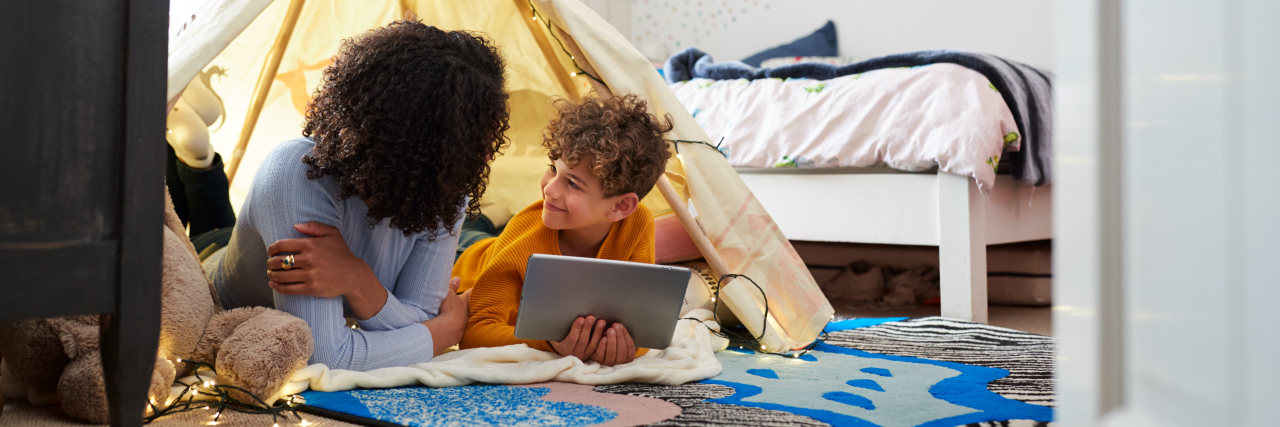What I Hope You'll Learn About Autism During the Coronavirus Pandemic
April is Autism Awareness Month. Typically during this time, I post something inspiring to help educate those around us about autism, and to encourage not only awareness, but acceptance. In today’s climate, however, it simply feels like too much to ask so many of you who are living in a state of exhaustion, fear, confusion and loneliness to learn more about something that may not directly impact your lives.
As we struggle to survive both physically and emotionally during the COVID-19 pandemic, we are being asked to maintain social distancing, stay isolated and stay at home. There is no going to the office, no going to school or sports, no quick trips to the store, no family outings or group gatherings. Weddings have been canceled and families are stuck inside their homes together all the time. This is not life as any of us expected it and it is hard. So this year in honor of Autism Awareness Month, it occurred to me that this is our opportunity to show you rather than tell you just how amazing, creative and resilient this group of individuals can be.
Individuals with autism as well as their parents and sometimes siblings have faced adversity, loneliness, social isolation and planning for things we did not expect. We have learned that we need to adapt to a different way of life, focus on the things we can control rather than the things we cannot, that there are no guarantees in life and that life isn’t always fair. Many parents of children with autism have learned that meeting a child’s emotional needs is more important than having perfect color-coded charts and ensuring every subject is mastered. Many of us know that doing what’s best for our child is more important than being constantly busy.
Children with autism as well as their parents may not spend our hours after school or on weekends at sports practices, at birthday parties or having playdates. Many of us are home a lot of the time and our weekends are not filled with the pressing demands of today’s family life. We often miss this and feel this deeply as we watch our neighbors and friends bounce from activity to activity with large groups of people. Our social lives are different due to our unique family dynamics. It is not easy, it can be frustrating and lonely at times. Our son adores playing with other kids and wants to be included all the time, and it is really difficult to see that he doesn’t have as many social outlets as other kids do.
But with all of these struggles also come the victories. I believe we are the lucky ones because we do not take these wins for granted ever. We are grateful and humbled at positive changes that might seem insignificant to others, such as when our kids start eating a new food, master a new game, learn something we have been working on for years or sit through a movie in a movie theater.
While the coronavirus pandemic is hard for all of us, it may not be as difficult for my family because in a sense we are a bit more prepared than most as a result of autism being a part of our lives. We are OK with social distancing more than most people we know. We are not mourning the loss of our jam-packed weekends or weeknights. We have a massive collection of board games, a whole house full of toys, crafts, sensory activities and random ideas we have come up with over the years to keep us busy and having fun while at home.
Of course, we miss our friends and families and this time is really hard, especially trying to educate the kids at home. But our family has been OK with the not knowing, the new normal, the social isolation. Worrying about when this will end just has not been a big topic of discussion here. Learning to accept good enough, not becoming overly committed to a certain outcome and focusing on what we can control rather than all of the things that we cannot is part of our routine.
Many individuals with autism know firsthand the pain of feeling isolated and misunderstood, of not feeling comfortable in a situation or setting they cannot escape from, of constantly having to adapt to things because that is what the rest of the world requires of them. They are the ones to watch right now because they are experts at developing coping mechanisms and tools to help them make it through.
So during the month of April, instead of becoming more aware or accepting of autism as an act of generosity or kindness for those who are on the spectrum, consider that becoming aware, educated and accepting may actually benefit you. Listening to us may provide you and your family with some tools, guidance and advice on how to not only survive but thrive when you are no longer waiting for “normal” to return but instead making the most of what your normal looks like today.
For more on the coronavirus, check out the following stories from our community:
- Creative Activities to Try With Your Kids While We’re Isolated at Home
- What to Do When Your Child on the Autism Spectrum’s Routine Is Disrupted by the Coronavirus
- One Reason the COVID-19 Pandemic Might Be Extra Challenging for Autistic Adults
- How Is the New Coronavirus Treated?
- 10 Face Masks People With Chronic Illness Recommend
Getty photo by Monkey Business Images.

